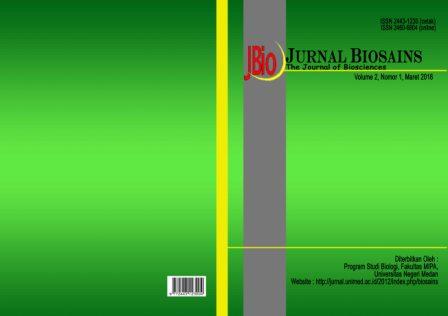Uji Toksisitas Ekstrak Etanol Daun Tanaman Tembakau (Nicotiana tabacum L.)
DOI:
https://doi.org/10.24114/jbio.v2i1.5209Abstract
Tobacco (Nicotiana tabacum L.) was a popular plant, usually used as cigarette material, traditional medicine, chewy tobacco and natural insecticide. This study aims to investigate toxicity effects of tobacco to mice (Mus musculus). The study had been done from March to July 2015 in Plant Physiology Laboratory of Mathematic and Natural Sciences Unimed and Phatology Laboratory USU. The study used male mice as the animal test. Twenty-five mices were divided in to 5 groups. One control group and four groups were given the ethanolic extracts of tobacco in four doses 10%; 15%; 20%; dan 25% orally. Evaluation of toxic effects was 24 hours until 3 days after administration. Evaluation included physical and physiological adverse, behaviour changes, and histopathologycal adverse of liver and kidney. According to the results of study, ethanolic extract of tobacco made a systemic toxicity. Most of doses (except control) caused acute toxicity symptoms and immediately death to the tested animals. It affected mices in physic, behaviour and anatomy. The toxic symptoms were uncontrolable movement, aggressivity, tail abnormality, coordination damages, pupil extention, and refflects damages. Another effects were gastric, intestinal and testis inflammations. The liver and kidney were highly susceptible to toxicant. Histopathologycal examination showed that toxic affected congestion and necrosis in liver and kidney. Keywords: ethanol extract, toxicity, tobacco, histopathology, miceDownloads
Published
Issue
Section
License
For Authors Jurnal Biosains agree to the following terms:
Authors retain copyright and grant the Jurnal Biosains (JBIO) right of first publication with the work simultaneously licensed under a Creative Commons Attribution License (CC BY-SA 4.0) that allows others to share (copy and redistribute the material in any medium or format) and adapt (remix, transform, and build upon the material) the work for any purpose, even commercially with an acknowledgement of the work's authorship and initial publication in JBIO (Jurnal Biosains)
Authors are able to enter into separate, additional contractual arrangements for the non-exclusive distribution of the journal's published version of the work (e.g., post it to an institutional repository or publish it in a book), with an acknowledgement of its initial publication in JBIO (Jurnal Biosains)
Authors are permitted and encouraged to post their work online (e.g., in institutional repositories or on their website) prior to and during the submission process, as it can lead to productive exchanges, as well as earlier and greater citation of published work (See The Effect of Open Access).


